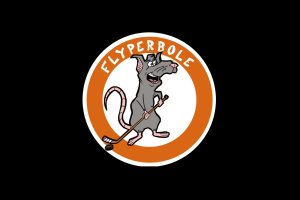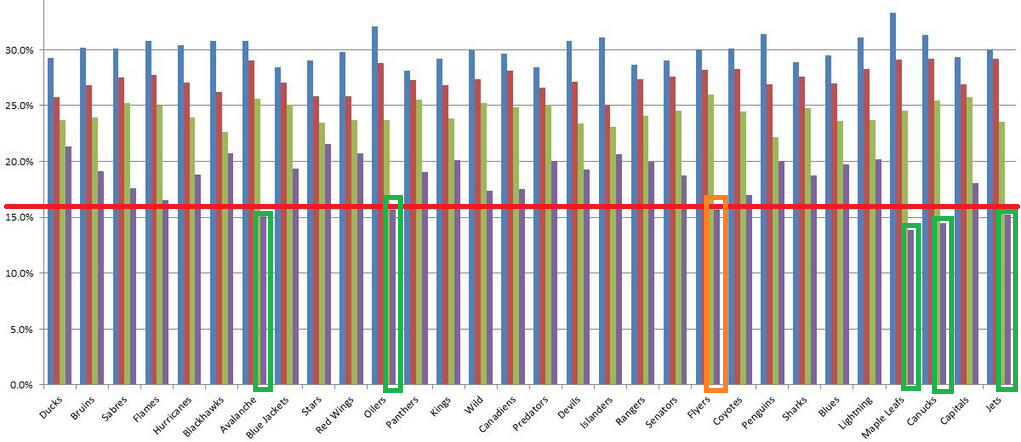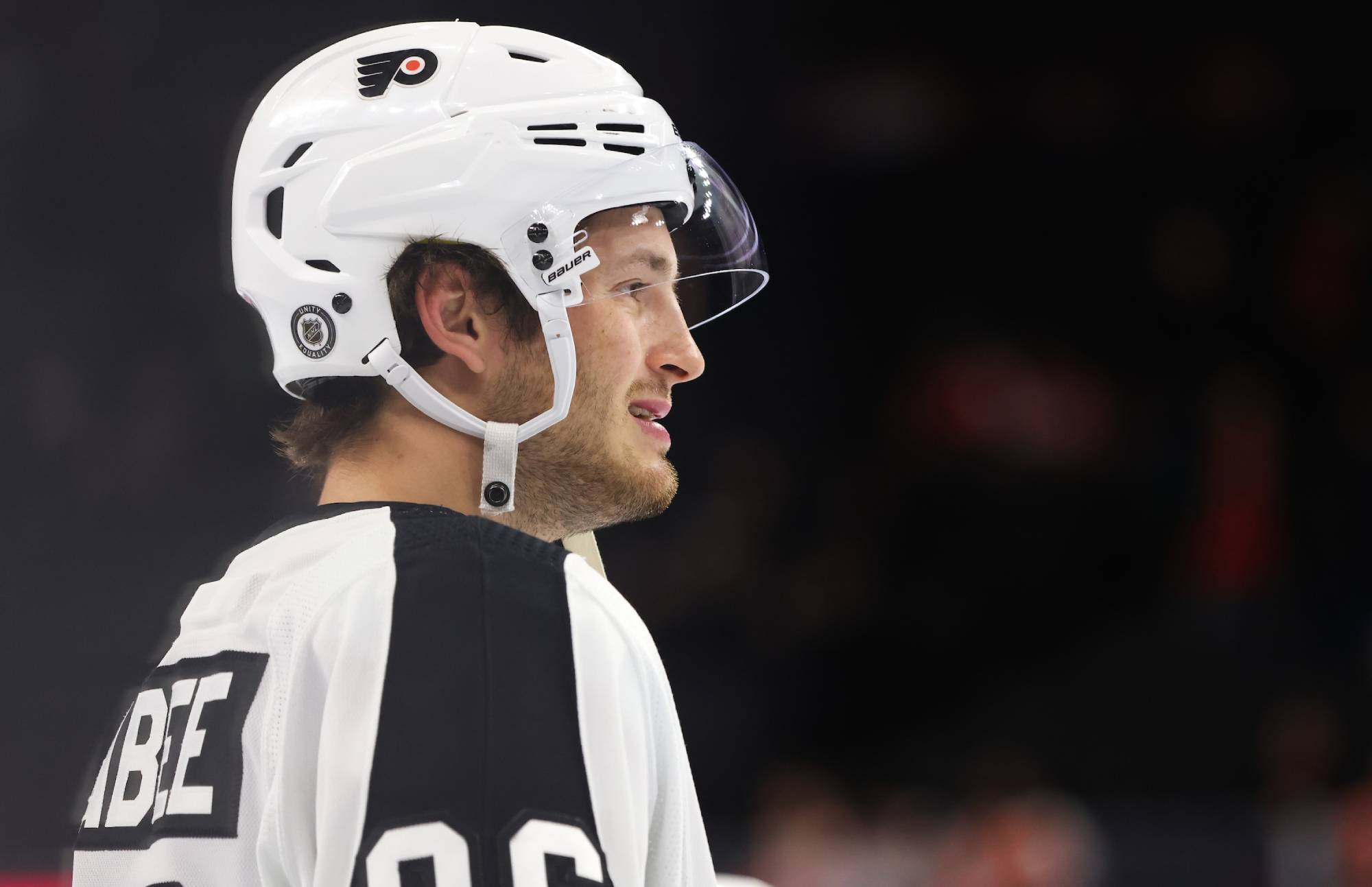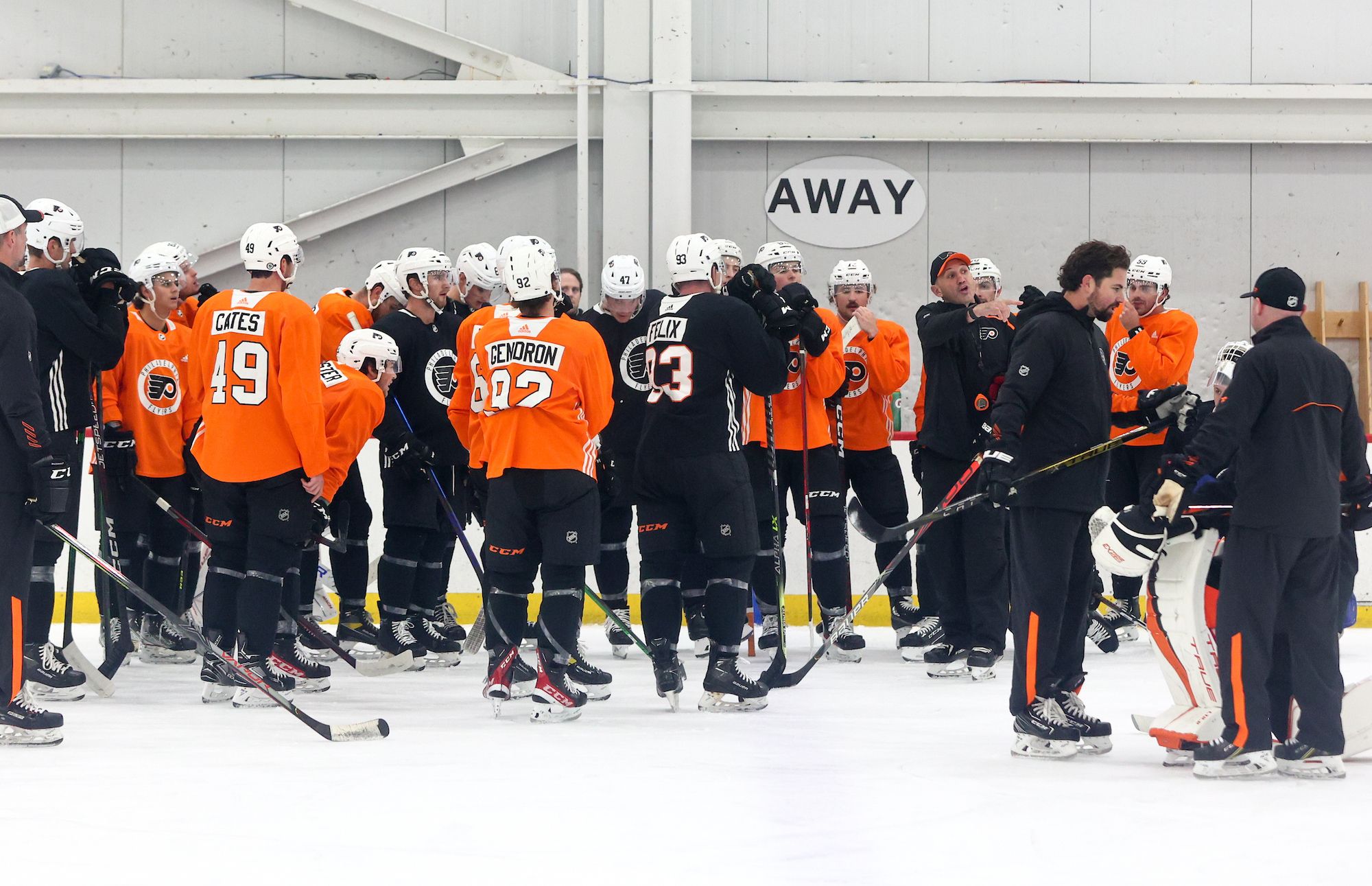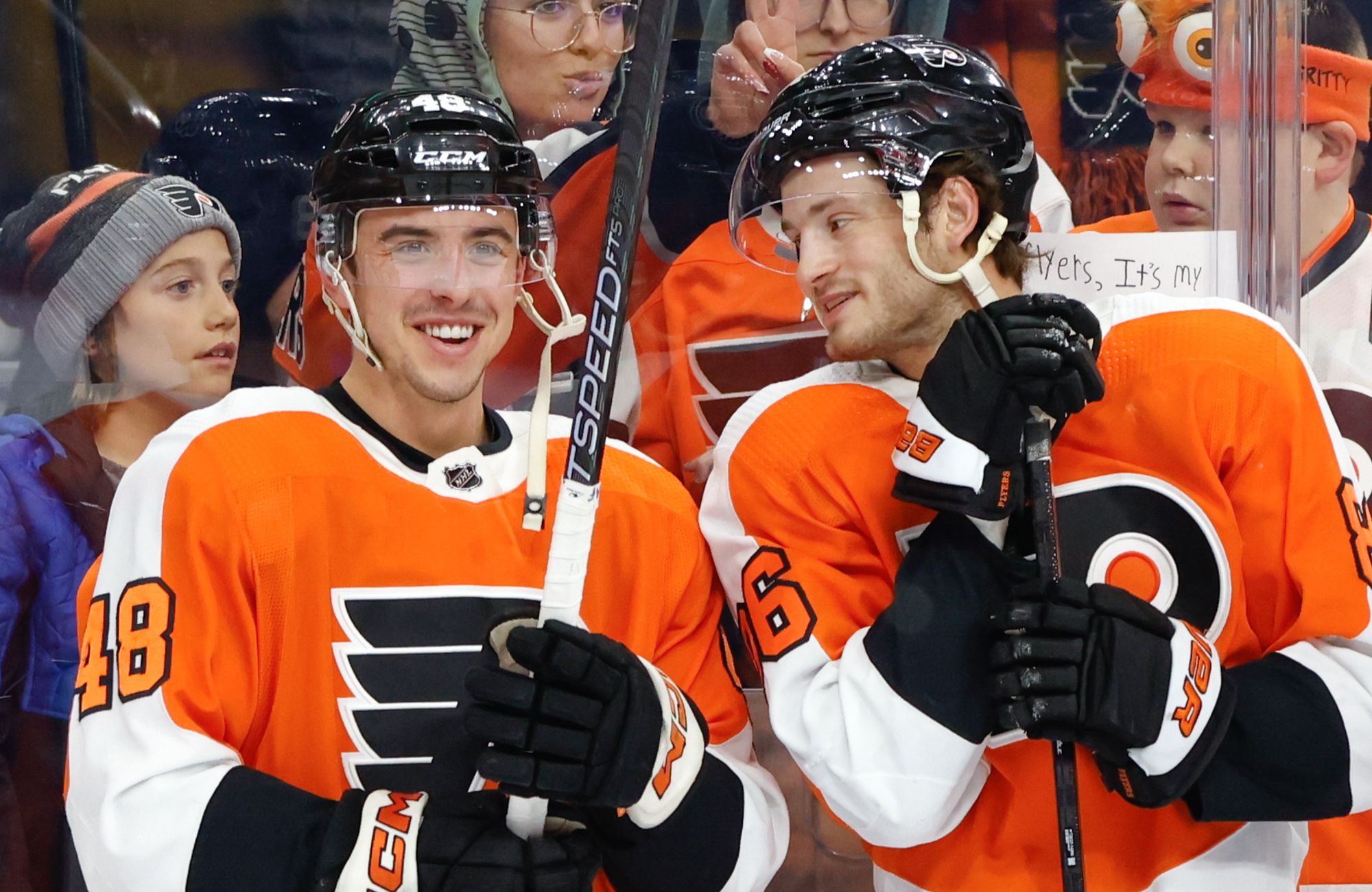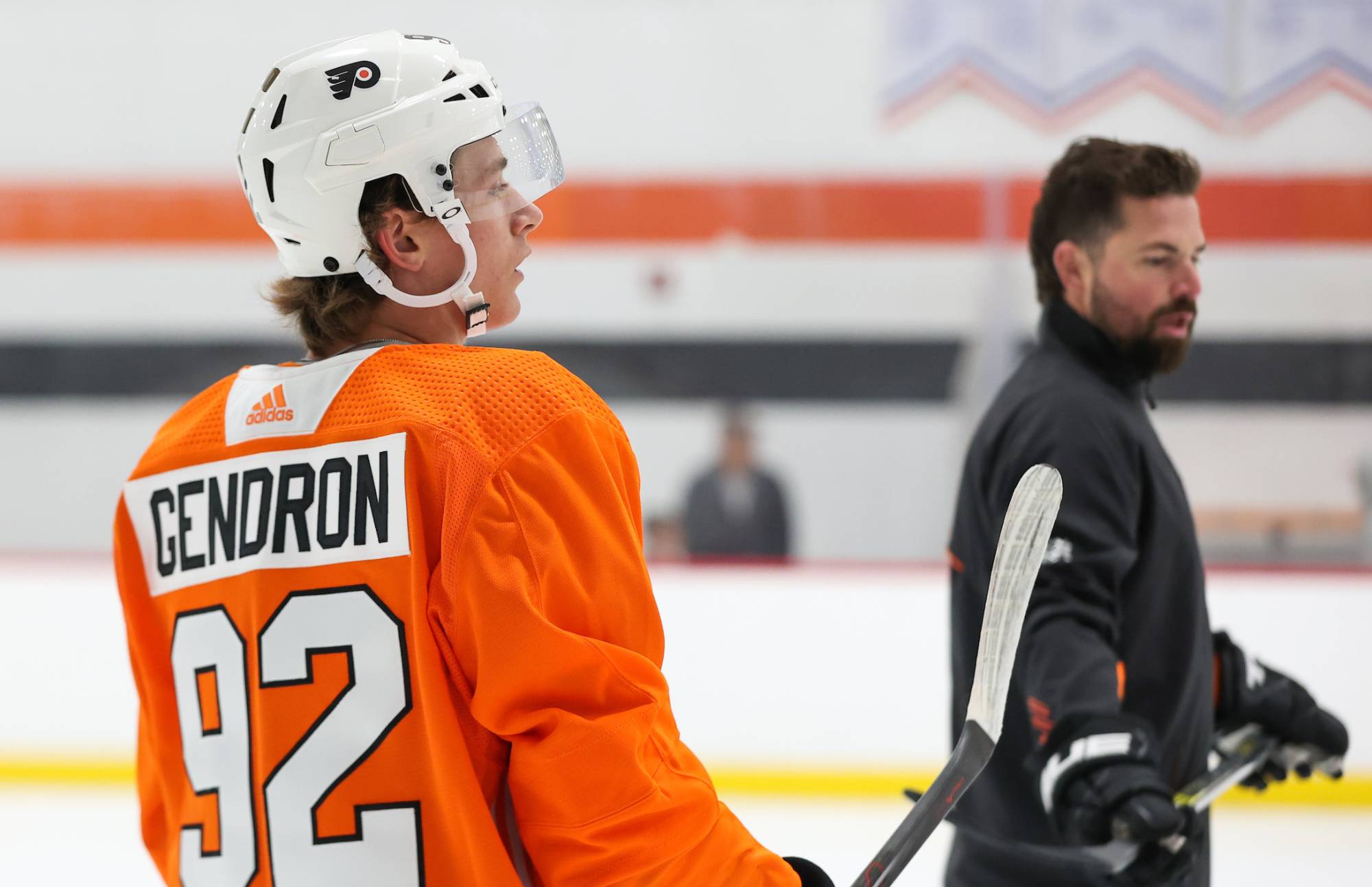Zac Rinaldo
2013-14 Stats
| GP | TOI/GP | Goals | Assists | Points |
| 67 | 7:42 | 2 | 2 | 4 |
| Corsi For | Corsi Rel | Quality of Comp. (TOI%) | Zone Start % | PDO |
| 46.4% (10) | -4.5% (10) | 26.3% (12) | 47.4% (10) | 95.8% (11) |
(Numbers in parentheses indicate descending rank among regular Flyers players at his position, i.e. one of the team’s top eight defensemen or top 13 forwards.)
Most frequent forward lines
| Linemates | Goals For% | Corsi For% | OZ/DZ% |
| Michael Raffl, Adam Hall | 50.0% (+2 / -2) | 50.3% | 53.1% |
| Adam Hall, Jay Rosehill | 16.7% (+1 / -5) | 40.0% | 44.4% |
| Adam Hall, Vincent Lecavalier | 100.0% (+1 / -0) | 57.4% | 40.0% |
The importance of a good fourth line
The very bottom of the NHL food chain, fourth-line forwards are often afterthoughts to an extent. They don’t play many minutes, often are asked to do very little in those minutes, and sometimes still find a way to be underwhelming in them.
Yet lately we’ve seen what exactly a good fourth line can bring to a hockey team. Look at the last few teams in the playoffs. The Rangers have been giving their fourth-liners 12-plus minutes a game in these playoffs, and it’s working for them (well, it had been). The Kings largely do the same with theirs. The Blackhawks trust theirs enough to give them meaningful defensive assignments, freeing up the rest of their team to succeed offensively.
Teams that can use four lines in actual productive manners are seeing rewards for it. Have the Flyers been doing that recently? Well, let’s consider this graph, which shows how much ice time each NHL team gives its four lines on average. (courtesy of Snark SD from Fear the Fin; additional boxes ours. Click to enlarge.)
All but five teams give their fourth line more ice time than the Flyers do. The Flyers have a lot of good forwards in their top-9, but by not rolling four lines, they’re limiting their potential as a forward group and a team.
Naturally, that brings us to the Flyers’ fourth line — and in particular, its most polarizing member, Zac Rinaldo.
Rinaldo is more or less the definition of an “energy guy”. He’s a fast skater, he hits really really hard, he fights anything that challenges him, and he more or less plays every shift like he’s shot out of a cannon. This endears him to a lot of the Flyers faithful and makes him fun to watch.
 Must Reads
Must Reads 
However, it also masks some deficiencies in other areas … such as the fact that he’s not at all a scorer, finds himself outshot/outchanced/outscored almost whenever he’s on the ice, and ultimately lacks the hockey smarts to take advantage of his good physical skills in any way other than “annoy the crap out of the other team”.
So if Rinaldo isn’t contributing in the traditional or obviously tangible ways (which, in fairness, are obviously not ways that the Flyers are counting on him to be contributing), he really needs to be on point in just about every other area to be a useful player. This requires keeping his emotions in check, doing the little things that fire up the team, and being an effective pest to the other team, all while not letting himself get into trouble.
Disciplinary struggles
Through Zac Rinaldo’s first 100 NHL games or so, he quickly established a reputation for being, well, insane. He picked up a lot of praise from some corners in his rookie year for his high-energy play and ability to draw penalties, but along with that came an even larger penchant to take even more penalties. And early on in his second year, it looked like that trend would continue.
But as that season went on, Rinaldo finally started to play a smarter game, drawing many more penalties than he was committing. And by March of that year, we had taken notice of it, and it gave us some hope moving forward:
[…] lately Rinaldo has been toning down the non-coincidental penalties against, drawing penalties from the other team’s players at a higher rate, and taking some really good players off the ice with him.
That he’s managed to take that step ahead is, no doubt, progress, and if he consistently keep doing what he’s been doing lately, he can start justifying Peter Laviolette’s propensity to play him over the team’s other fourth-line forward options. And who knows — the guy’s only 22, so maybe, just maybe, there’s still some time for him to develop some other skill that will allow him to really make his name in the NHL as more than just an agitator.
And technically speaking, Rinaldo did take fewer penalties in the 2013-14 campaign (when adjusted for ice time) than he did last year. But when looking at his numbers on the balance (taking into account the number of penalties he is drawing as well), the numbers don’t paint a great picture.
Below is a chart that shows the number of penalties drawn and taken in each of Rinaldo’s three NHL seasons in both of these capabilities. The information below is from Extra Skater, reflected in a penalties-per-60-minutes-of-ice-time number.
| Year (GP) | Penalties Drawn | Penalties Taken | Differential |
| 2011-12 (66) | 4.6 | 6.7 | -2.1 |
| 2013 (32) | 5.8 | 5.2 | +0.6 |
| 2013-14 (67) | 3.3 | 4.9 | -1.6 |
The Rinaldo supporter looks at this chart, sees that Rinaldo’s penalties taken have dropped in each of his three NHL seasons, and point to that as proof that he’s improving as a player. The detractor looks at the chart and sees that, after a positive differential last season, Rinaldo’s drawn penalties took a tumble and that he’s been a drastic net negative in two of his three seasons, including this one.
One can tolerate a high number of penalties taken if the guy is able to put his team on the power play enough times to make up for it. Last year, Rinaldo was. This year, he wasn’t, and it makes the number of penalties that he took that much worse to deal with.
You got a bad reputation
A frequent counter brought up to Rinaldo’s high penalty counts is the idea that he takes several “reputation penalties” — penalties that are borderline or weak, but only were called because the perpetrator of them has a bit of a rap sheet. Every so often, I’d agree — Rinaldo isn’t a guy who gets the benefit of the doubt, and that sometimes leads to dubious calls against him.
Regardless, there are two things to remember on that front. First, penalties don’t count less because they’re reputation penalties, and if Rinaldo is playing in a way that even puts him in a position to be taking those, he needs to stop it. And second, while I do believe he’s a calmer player than he used to be, Rinaldo has to remember how and why he got that reputation in the first place.
Because every so often he’ll do something like jump a player four seconds into his shift, getting ejected and putting the Flyers on a seven-minute penalty kill. Or he’ll launch a hit like this headshot on Buffalo’s Chad Ruhwedel, which got him suspended for four games to close out the regular season.
Those, by themselves, are isolated incidents (the suspension was Rinaldo’s first in over two years). But regardless, they are the types of plays that the guy absolutely has to avoid. Because when you’re in the position Rinaldo’s in, where every fan and player and official in the league sees you as a crazy person, that’s the reputation that follows you, and you get no margin for error until you prove you don’t need any.
A well-rounded player?
Despite a step back in terms of discipline and not much to show anywhere else, there still seems to be a disconnect in some circles between what Rinaldo actually has brought to the table (questionable decision-making, limited hockey skill) and what people seem to think he means to the Flyers.
Don’t believe me? Ask them yourselves. An article on the Flyers’ own website in April highlighted Rinaldo’s season and making light of the fact that he had become more of a well-rounded player — and in doing so, helped show where exactly the perception of Rinaldo is … and where it might be off a bit.
The article mentioned that Rinaldo is “getting more minutes”, which misses the fact that his average ice time actually decreased from last season (8:23 per game) to this one (7:42). It praised his penalty-drawing, completely ignoring the matter of — as we’ve already discussed — his penalty-taking outweighing that by a not-so-small margin.
It mentioned his hitting ability, which (when clean) is obvious and undeniable — and to the eye, Rinaldo’s hits often seem to come in the offensive zone and/or while chasing down the other team down on the forecheck, which is good. Regardless, you don’t want to be the guy who does nothing but hit, because of course, if you’re laying a (legal) hit, it means you’re chasing the guy who has the puck, and you don’t want to be spending too much time doing that.
So then what are we left with? The things you can’t quantify and summarize, of course.
The heart-and-soul debate
Rinaldo receives widespread acclaim for his intangibles, with the amount of “heart” and “grit” and “hustle” that he shows often becoming a key point of praise for his game. This leads to things like the Inquirer’s Sam Carchidi insinuating back in October (in a since-deleted article, oddly enough) that “if all the Flyers had played with the hustle shown by Rinaldo, Peter Laviolette would probably still be the coach”, or to fans intimating that Rinaldo (or “Remaldo”, I guess) is the “one player [on the Flyers] with heart” as if that actually means something.
And to be sure, Rinaldo does bring those things. He plays hard as hell every game and that’s obvious. This high level of effort and emotion and energy, which manifests itself in things like hits and fights, is why he’s so beloved by the fans and why the coaches and organization seem to like him.
But are his heart and effort really enough to make up for his shortcomings almost everywhere else? And if the implication is that despite these shortcomings, it’s vital to have a player like him playing eight minutes a game in order to fire up the rest of the Flyers and get them mentally ready to compete and win games, doesn’t that say more about the Flyers than it does about Rinaldo?
Zac Rinaldo brings a lot of emotion to the ice rink, the bench, and the locker room. Sometimes he’s able to use that to his (and, in turn, the team’s) advantage. But if that emotion is just about all he’s bringing, he needs to be using it productively all the time, not just “sometimes”.
Preseason expectations
Let’s check back on our season preview for Zac Rinaldo and see what we thought could happen with him this year.
Best case…
The Rinaldo we saw from mid-February on is the real Rinaldo, and he continues to annoy the hell out of people and draw an insane amount of penalties while managing not to take many of his own. He hits well and often but not illegally, and he can bring enough in those areas to outweigh his limitations in other areas (i.e. scoring, possession).
Worst case…
Rinaldo reverts back to his rookie-season self where he can’t control himself and gets a ton of penalties, fairly or unfairly. The ice continues to tilt significantly towards the Flyers’ own end when he’s on the ice and he ends up being a complete liability.
Verdict
Given that the penalties he took outweighed the penalties he drew, and that he scored four points in 67 games, and that the Flyers routinely find themselves on the wrong side of the ice when he’s on the ice, what we saw as the worst-case scenario seems pretty close to what actually came to fruition. It’s unfortunate.
As we talked about already, the best teams in hockey right now are not afraid to give regular shifts to their fourth-line players, because those players are more than old-fashioned “energy” or “heart-and-soul” guys — they’re guys who bring actual skill to the table. The Flyers have at least a handful of players who can fit that description to a T, including some of their young, promising ones — can Craig Berube and Ron Hextall really look someone like Scott Laughton in the eye this September and say “we’re going to send you to Lehigh Valley because we need to keep Rino on the team”?
If they think that they can, then go for it. Work with him and pray that he learns something. Rinaldo’s just 24 next year, he’s got a great work ethic, and he’s got the physical tools to be a productive fourth-liner if his head’s in the right place. But after a step-back year in terms of discipline, they need to be really sure about his head being in the right place.
And if they aren’t? Then Rinaldo should have to fight for his spot on the roster in training camp just like everyone else on the fringe. Because another season like this one he just had won’t cut it, and the Flyers need him to be better — no matter how much fun he is to watch.
***
Feel free to vote in the poll below to grade Zac Rinaldo’s season on a scale from 1 to 10. Vote based on your expectations for him coming into the season — i.e. 1 being “he was incredibly disappointing and I want him out now”, 10 being “he was outstanding even beyond my craziest expectations”.
How would you grade Zac Rinaldo’s 2013-14 season?
| 1 | 42 |
| 2 | 40 |
| 3 | 72 |
| 4 | 98 |
| 5 | 80 |
| 6 | 61 |
| 7 | 23 |
| 8 | 9 |
| 9 | 4 |
| 10 | 13 |




